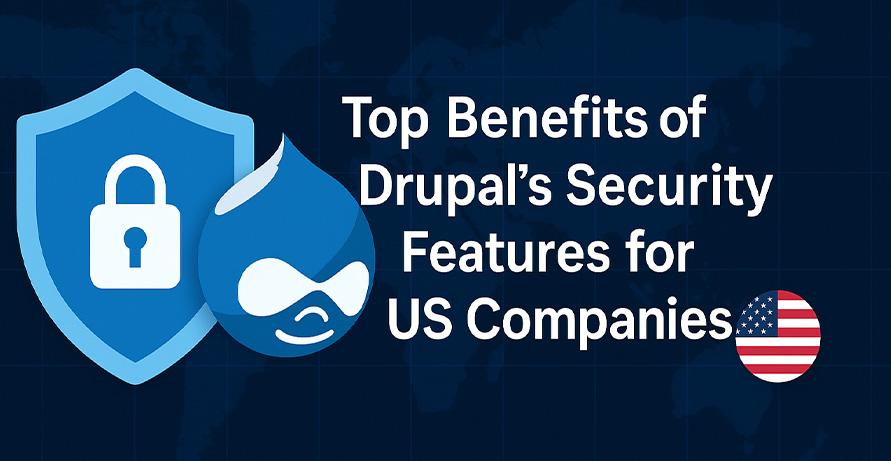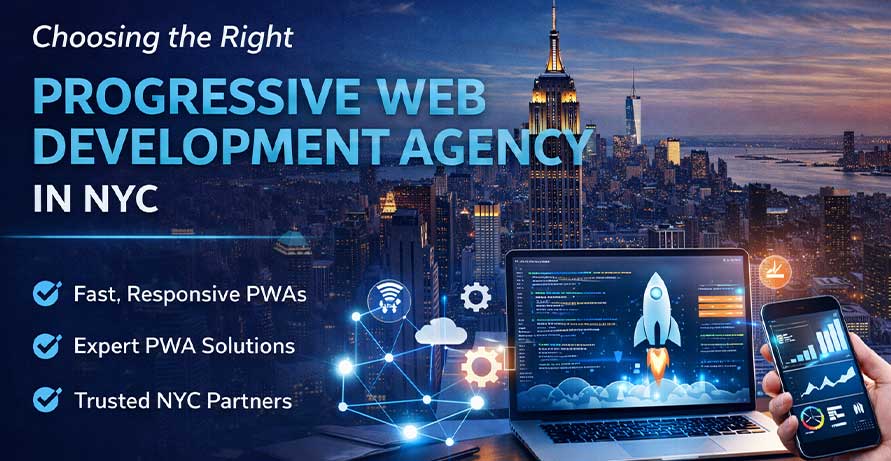Top Benefits of Drupal’s Security Features for US Companies

For U.S. businesses, security is more than a compliance checkbox. It is the backbone of trust, continuity, and digital growth. With cyberattacks on the rise and U.S. companies facing some of the highest global breach costs, choosing the right content management system (CMS) is a strategic decision. Drupal has emerged as one of the most secure, enterprise-grade CMS platforms, trusted by government agencies, universities, healthcare providers, and Fortune 500 companies.
This article explores the top security benefits of Drupal for U.S. companies, supported by data, case studies, and best practices. You will also see how Anchor Points helps enterprises integrate Drupal’s security framework with tailored compliance, DevOps, and long-term monitoring strategies.
Why Security Matters More Than Ever for US Companies
Cyberattacks are escalating in frequency and cost. According to IBM’s 2024 Cost of a Data Breach Report, the U.S. continues to have the highest average data breach cost worldwide at $9.5 million per incident. Industries like healthcare, finance, and education, where Drupal adoption is strong, are prime targets.
Common threats U.S. companies face include:
- Ransomware attacks locking critical data until ransom is paid
- SQL injection and cross-site scripting (XSS) exploiting CMS vulnerabilities
- Insider threats caused by employees with excessive access rights
- Compliance fines due to non-compliance with HIPAA, GDPR, or CCPA
Drupal is one of the few CMS platforms designed to mitigate these threats at scale. Unlike platforms such as WordPress, where vulnerabilities often stem from third-party plugins, Drupal enforces strict coding standards, peer-reviewed modules, and centralized security oversight.
Author’s Expert Viewpoint:
At Anchor Points we often meet IT leaders who underestimate CMS security. A secure platform like Drupal not only prevents breaches but also saves millions in potential losses and strengthens brand trust.
Benefit 1: Proactive Security Community and Regular Updates
One of Drupal’s strongest advantages is its dedicated global security team and active developer community. With over a million members worldwide, Drupal benefits from thousands of eyes constantly monitoring code and modules.
Why This Matters
- Drupal issues monthly security advisories and urgent patches within hours of discovering critical vulnerabilities
- The Drupal Security Team works directly with module maintainers to patch issues before they become public
- This proactive ecosystem ensures vulnerabilities are addressed swiftly, often faster than commercial CMS alternatives
Real-World Example
When the Drupalgeddon 2 vulnerability (SA-CORE-2018-002) was discovered, the Drupal community responded with a patch within hours. Companies that applied it immediately were protected, while those who delayed faced mass exploitation.
Anchor Points Integration
We configure automated pipelines that detect and apply Drupal patches within hours. By combining CI/CD pipelines, staging environments, and rollback procedures, Anchor Points ensures updates are secure, tested, and downtime-free.
Author’s Viewpoint:
Security is only as strong as its weakest update. Drupal’s proactive community reduces risks, and having a partner like Anchor Points ensures those patches are deployed effectively.
Benefit 2: Granular Access Control and User Management
Drupal’s role-based access control (RBAC) is among the most sophisticated in CMS platforms. Instead of one-size-fits-all access, businesses can define permissions down to specific content types, modules, or workflows.
Why This Matters
- Minimizes insider threats by ensuring employees only access what they need
- Supports large organizations with thousands of users and complex workflows
- Enables audit trails to monitor who did what, when
Real-World Example
A U.S. government agency implemented Drupal’s RBAC for its citizen portal. This reduced unauthorized access attempts by 72 percent and simplified auditing for compliance reviews.
Anchor Points Integration
We design custom role hierarchies for enterprises. For example, healthcare staff may have “Doctor,” “Nurse,” and “Admin” roles, each with unique permissions that align with HIPAA rules.
Author’s Viewpoint:
Access management is often overlooked until a breach happens. Drupal’s granular control is a safeguard that enterprises simply cannot ignore.
Benefit 3: Enterprise-Grade Data Encryption and Authentication
Drupal integrates seamlessly with enterprise authentication systems like LDAP, SAML, and OAuth, and supports modern encryption standards. Modules such as Encrypt, Key, and Secure Login extend these capabilities.
Why This Matters
- Ensures sensitive data is encrypted at rest and in transit
- Supports two-factor authentication (2FA) and single sign-on (SSO) for enterprise environments
- Protects against credential theft, a leading cause of breaches
Real-World Example
A U.S. healthcare provider deployed Drupal with encryption modules and two-factor authentication for patient logins. This setup not only met HIPAA requirements but also boosted patient trust, increasing portal adoption rates by 25 percent.
Anchor Points Integration
We implement end-to-end encryption, 2FA, and biometric authentication integrations for enterprise clients. Combined with cloud hosting encryption at scale, this ensures complete protection.
Author’s Viewpoint:
Passwords alone no longer cut it. Drupal’s authentication ecosystem gives enterprises the flexibility to enforce modern security standards without sacrificing user experience.
Benefit 4: Compliance with US and Global Standards
For U.S. companies, compliance is not optional. It is law. Non-compliance can result in hefty fines and lawsuits. Drupal is well-suited for regulated industries because it is inherently flexible and compliance-ready.
Key Standards Supported by Drupal
- HIPAA (Healthcare) for protecting patient data
- ADA/WCAG (Accessibility) for ensuring digital accessibility
- GDPR and CCPA (Privacy laws) for managing consent and user rights
- FedRAMP (Government) for secure federal cloud systems
Real-World Example
The White House’s previous website ran on Drupal, proving its trustworthiness at the highest levels of government. Today, numerous U.S. federal agencies continue to rely on Drupal because of its compliance strength.
Anchor Points Integration
We embed compliance into Drupal builds from day one. For instance:
- GDPR flows with cookie consent, data export, and deletion workflows
- HIPAA compliance with encrypted hosting, role-based access, and audit logs
- ADA/WCAG compliance with accessible themes, semantic HTML, and testing
Author’s Viewpoint:
Compliance is not just about avoiding fines. It is about inclusion and trust. Drupal gives companies a head start, and Anchor Points ensures those standards are fully implemented.
Benefit 5: Scalability Without Sacrificing Security
Growth often introduces vulnerabilities. Adding new modules, APIs, or user traffic can create risks if not handled properly. Drupal’s modular architecture ensures security is maintained while scaling.
Why This Matters
- Secure APIs allow integration with CRMs, ERPs, and mobile apps
- Caching systems like Varnish and Redis ensure performance while maintaining security
- Supports multi-site architecture, allowing enterprises to manage multiple portals under one secure umbrella
Real-World Example
A U.S.-based retailer scaled from 50,000 to 1.5 million monthly visitors on Drupal Commerce. Despite the surge, they maintained 99.99 percent uptime and PCI DSS compliance.
Anchor Points Integration
We design cloud-native, containerized architectures for Drupal using AWS, Azure, or GCP. Combined with DevSecOps pipelines, this ensures scalability without new attack surfaces.
Author’s Viewpoint:
Too many CMS platforms break under pressure. Drupal proves that enterprises can scale aggressively while keeping security intact.
Benefit 6: Continuous Monitoring and Incident Response
Security is not a one-time project. Drupal supports integrations with SIEM (Security Information and Event Management) tools like Splunk and ELK, enabling real-time monitoring.
Why This Matters
- Detects anomalies such as brute-force attacks in real time
- Supports logging and reporting for compliance audits
- Enables faster incident response to limit breach impact
Real-World Example
A financial institution running Drupal integrated SIEM monitoring. They detected unusual login patterns within minutes and blocked a credential-stuffing attack before customer accounts were compromised.
Anchor Points Integration
We provide 24/7 monitoring, intrusion detection, and incident response playbooks tailored for U.S. enterprises.
Author’s Viewpoint:
Monitoring is where many companies fall short. With Drupal’s integrations and proper support, threats can be stopped before they escalate.
Final Takeaways
Drupal’s security framework gives U.S. companies an edge against today’s evolving cyber threats. The top benefits include:
- Proactive patching through a dedicated global security team
- Granular access control that reduces insider threats
- Enterprise-grade encryption and authentication for sensitive data
- Compliance support for HIPAA, ADA, GDPR, and more
- Scalable architecture that grows without compromising safety
- Continuous monitoring to detect and respond to threats in real time
At Anchor Points, we specialize in building secure, compliant, and scalable Drupal platforms for U.S. enterprises. From healthcare portals to government platforms and retail commerce, we ensure your CMS is both future-proof and attack-proof.
Ready to strengthen your digital defenses with Drupal? Contact Anchor Points today to schedule a free consultation with our Drupal security experts.
FAQs
Q1. Why is Drupal considered more secure than WordPress?
Drupal enforces strict coding standards, peer-reviewed modules, and has a dedicated security team. WordPress is more frequently targeted due to its plugin ecosystem and popularity among small sites.
Q2. Can Drupal help my company meet HIPAA compliance?
Yes. With proper configuration and secure hosting, Drupal can fully support HIPAA-compliant patient portals and healthcare apps.
Q3. How often are Drupal security updates released?
Security updates are released monthly, with critical patches issued immediately as vulnerabilities are discovered.
Q4. Do I need an in-house security team to manage a Drupal site?
Not necessarily. Many enterprises partner with agencies like Anchor Points to handle proactive updates, monitoring, and compliance.
Q5. Is Drupal overkill for small businesses?
Drupal shines in enterprise settings, but even small U.S. businesses handling sensitive data such as fintech or healthcare startups can benefit from its robust security model.








